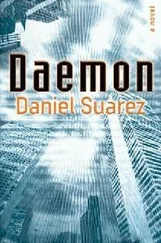As imitation sunlight from the video washed over him, he knew if he watched it long enough it would give him sunburn. It had been years since Grady had seen true sunlight, but the truth was that Hibernity’s in-cell imitation of the outdoors was more than just convincing. It wasn’t just video. It was flowing, heather-scented air. It was sunlight at the actual frequency of sunlight—not the hydrargyrum medium-arc iodide lights used by lower-tech society at large but powerful thin film OLEDs that could pump out electromagnetic radiation anywhere below, above, and along the visible wavelength. Materials science had undergone something of a renaissance somewhere in the 1980s, as he now knew, and Grady now took for granted things that only a few years before would have seemed akin to magic.
But regaining control of his cell systems was not a prelude to escape from Hibernity prison. No one had ever escaped. It had taken him more than a year to accept this—that is, if he’d ever really accepted it.
At least now he had some idea how the prison complex worked. In a word: poorly. His warders barely had control of the place, and they walked every day in fear of the geniuses who had nearly wrested control of it from them.
There were serious limitations on what was known, though. The control systems of the prison were segregated, with each cell compartmentalized and self-contained. Prison construction and maintenance was managed by semisentient robotic equipment that melted and resolidified rock as needed. These bots were kept off the network that was available to both the guards and the prisoners.
There were other limitations to the Resistors’ knowledge. They had no clear idea how many prisoners were held at Hibernity. Nor did they know where the prison itself was located.
Grady had spent months examining video from compromised surveillance cameras in the garrison guardrooms and corridors, hoping to glean some clue as to their location. Most of the guards were Morrison clones, and they spent the majority of their time playing cruel pranks on each another. He recalled the original Morrison calling his lesser sons “hyenas,” and the description was pretty apt. They squabbled and raged at their fates, posted as they were at the end of the world.
But they had all developed a healthy respect for the Resistors.
He recalled watching a security monitor at the edge of the Resistors’ domain—a lone sentry post where graffito left by a guard had communicated a warning to his fellow officers:
The Sensors Lie.
And that pretty much summed up the situation.
The Hibernity complex continued, year in and year out, to all appearances self-contained, creating all the water and food it needed by breaking down matter with fusion energy. Creating food supplies by rearranging molecules into proteins and carbohydrates in automated labs. They were largely self-sufficient here, so no one from the outside world need ever visit. Sustainability was apparently yet another one of the BTC’s technological achievements—wasted on them though it was.
Looking into a hand mirror, which he’d created from polished steel, Grady could see how he’d changed over the years—both physically and mentally. He’d lost that half-smile that he’d always worn back when the world was continually amazing him. He was dour and determined now.
And he bore the marks of his fight. His back and sides were covered with scars from the physical abuse he’d suffered from the tentacle restraint system. He also had circular marks at intervals around his head and temples where machinery had drilled into his skull to hold it in place while it inserted (and later removed) the carbon microthreads.
And then there were the emotional scars. The lost memories—gaps in his childhood, the loss of his parents and identity. These made the memories he still retained all the more precious. There were just enough of them to suggest that he’d been happy once. He knew his parents were close to him, but he couldn’t recall their names or even their faces.
Some of the more mundane details had been filled in by his cell’s subject information file—his full name and work history, for example, but that didn’t make him feel complete.
Nonetheless he felt sure he was still Jon Grady.
He hadn’t seen another human being in the flesh for more than three years. The video system helped (he could pretend to be moving through a market crowd in the streets of Hong Kong, for example), but he still craved actual human contact. That was something he’d never thought would be so important to him. He’d been so wrapped up in his own world for most of his life, but now that he was actually without human interaction, he realized how much he missed it—even feeling like an outsider wasn’t the same as actually being alone. Entombed within solid rock. Escape impossible.
His fellow Resistors helped, of course, and they could pass messages to one another (along with designs and tools) via polymer worms, but he’d never seen his fellow prisoners.
And of course he never stopped thinking about the outside world—and about Bert, Raj, and the others. What had happened to them? He even wondered what had happened to Marrano and Johnson—the two Wall Street guys who’d been visiting the lab when the BTC came down on them. Maybe they were BTC officers—who knew?
How many of his friends were here in Hibernity? He feared the worst for them. But Grady made it his mission to find them, and that mission had so far failed. He couldn’t imagine suffering under the cruelty of the interrogatory AIs for years. He’d only been subjected to it for five months, and that had nearly driven him insane. He didn’t want to contemplate how badly he’d failed Bert and the others. So far the Resistors only numbered a few dozen members—only adding one to their number since Grady had joined. No telling how many others remained undiscovered and without hope. The crawlers moved randomly, and only found new cells by chance.
Grady was roused from his thoughts by a brilliant red laser dot flashed across his video of the Italian coastline. He gestured with one hand to dismiss the video. The indifferent gray nanomaterial walls returned, but the laser dot remained.
It was a beacon he’d rigged to alert him whenever a message from a fellow Resistor came in.
Grady moved toward a jerry-rigged computer on his only table. Since they couldn’t trust BTC computer systems, they’d built their own from parts their polymer worms had scavenged. Grady’s was a system nearly invisible to the naked eye, assembled on a ceramic plate. The computer’s microscopic quantum processor he’d gleaned from the multiprocessor array that powered the interrogatory AI’s brain. No loss there. The machine had a thousand more of them, and while silencing the alarm had been difficult, it felt like payback to tinker with the sadistic AI’s mind.
Grady had followed a design worked up by one of the pioneers of quantum computing—Aleksandrina Kovshevnikov, a Bulgarian woman in her fifties who was also interred here in Hibernity. Her level of intelligence made speaking with her painful, for she didn’t mask her disdain for anyone not her intellectual equal. Only her respect for Grady’s supposed achievement made her willing to assist him. The computer she’d helped him build was a hundred thousand times more powerful than anything he’d ever had access to. And it fit on a small dinner plate.
Grady tapped at the computer’s holographic 3D field. Two-dimensional displays had been left behind in the ’90s; phased array optics and plasma emission made vivid, three-dimensional holographic fields practical. These realistic apparitions could be manipulated by hand. It was remarkable how quickly his mind had grafted onto this new form of UI, and by now it felt as natural as working with real physical objects. A few deft motions of his hand, and he could suddenly see a voiceprint equalizer floating in the air before him—a security measure against AIs masquerading as friends.
Читать дальше












